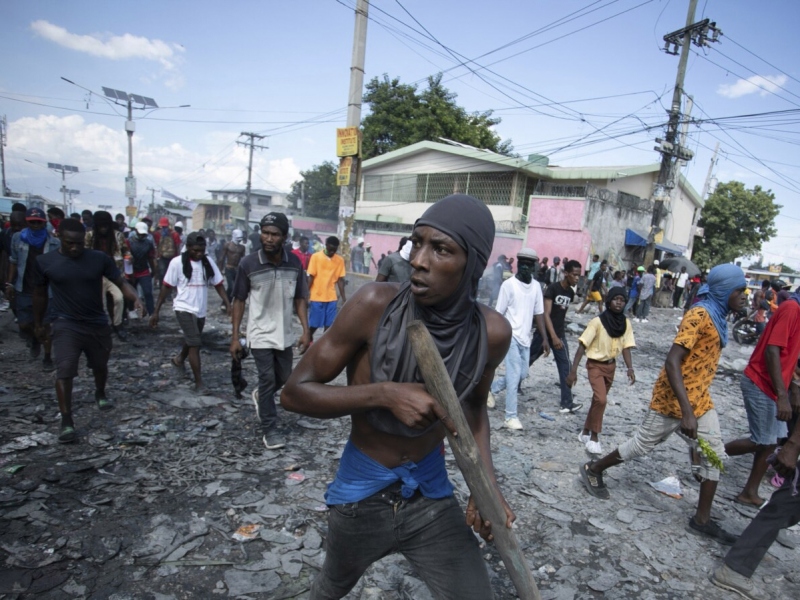The UN Organization for the Protection of Children (UNICEF) has reported that gangs in Haiti have recruited an unprecedented number of minors, highlighting a growing protection concern in the violent Caribbean nation.
UNICEF stated in a study published on November 25, 2024, that last year saw a 70% surge in the recruitment of children.
Catherine Russell, the executive director of UNICEF and the leading advocate for Haiti on the Inter-Agency Standing Committee, said “Children in Haiti are trapped in a vicious cycle – recruited into the very armed groups that are fueling their desperation, and the numbers are growing.”
Russell added, “This unacceptable trend must be reversed by ensuring children’s safety and welfare are prioritized by all parties.”
The study is released at a time when Haitian violence is not showing any signs of stopping, poverty is growing, and political uncertainty is causing further unrest. The goal of gangs, who now control 85% of Port-au-Prince, the capital, is to take complete control of the city.
UNICEF’s representative in Haiti, Geeta Narayan, stated that young boys are frequently utilized as informers “because they’re invisible and not seen as a threat.” Some are armed and coerced into taking part in assaults. In the meanwhile, gang members compel girls to cook, clean, and even serve as their “wives.”
“They’re not doing this voluntarily,” Narayan said. “Even when they are armed with weapons, the child here is the victim.”
Top of Form
South America’s geopolitical ascent, Canada’s multiculturalism, and US politics—we bring you the stories that count.
Recruiting youngsters is frequently simple in a nation where over 60% of the population makes less than $4 a day and hundreds of thousands of Haitians are hungry or on the verge of starvation.
According to a UN Security Council study, one young person in a gang claimed to get $33 every Saturday, while another claimed to have received thousands of dollars during his first month of involvement in a gang operation.
“Children and families are becoming increasingly desperate in some cases because of the extreme poverty,” Narayan stated.
Gunmen frequently threaten kids or their families or outright kidnap them if they don’t want to join a gang.
Additionally, gangs target children who are taken from their families after being deported from the Dominican Republic, which borders Haiti on the island of Hispaniola.
“Those children are increasingly the ones targeted,” Narayan said.
A vigilante movement that started last year to target suspected gang members is gaining traction, proving that gangs are not the only menace.
According to UNICEF, children “are often viewed with suspicion, and risk being branded as spies or even killed by vigilante movements. When they defect or refuse to join the violence, their lives and safety are immediately at risk.”
A video of a child’s body laying close to an adult who was also killed was shared on social media last week following gang attacks on an area around a wealthy subdivision. According to police, citizens brandishing machetes and firearms engaged in side-by-side combat with authorities that day, killing at least 28 alleged gang members.
According to the UN research, the gangs that recruit the most minors are Terre Noire, Brooklyn, Kraze Barye, Grand Ravine, and 5 Segonn.
As gangs watch, new recruits are typically handed money to “buy friends” and instructed to buy meals. They then take part in conflicts and, for instance, get promoted if they murder someone. The recruit joins the gang after two or three years if they can show they are not spies, according to the article.
Due to the closure of several schools and the increased vulnerability of children—gang violence has left over 700,000 people homeless in recent years, including an estimated 365,000 minors—enrollment is on the rise. Numerous individuals reside in temporary shelters where they are targeted by gangs and subjected to physical and sexual abuse.
A Human Rights Watch report release reveals that “criminal groups in Haiti are subjecting girls and women to horrific sexual abuse.”
A 14-year-old girl from the capital was mentioned in the article as saying that she was kidnapped and raped several times by several guys over five days at a home with six other girls who were also raped and abused.
Human Rights Watch said that although there has been less combat between armed groups this year, there have been more attacks on Haitians, law enforcement, and vital infrastructure.
“Criminal groups have often used sexual violence to instill fear in rival territories,” it stated. (https://nycaribnews.com/haiti-recruitment-of-children-by-gangs-increased-by-70-says-un/)



































